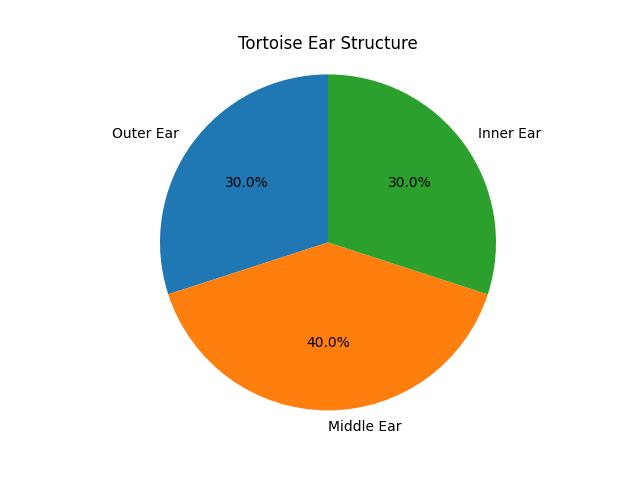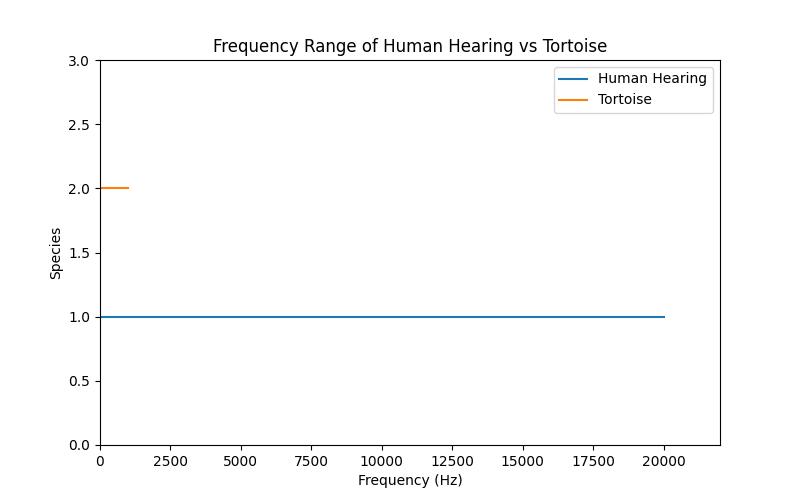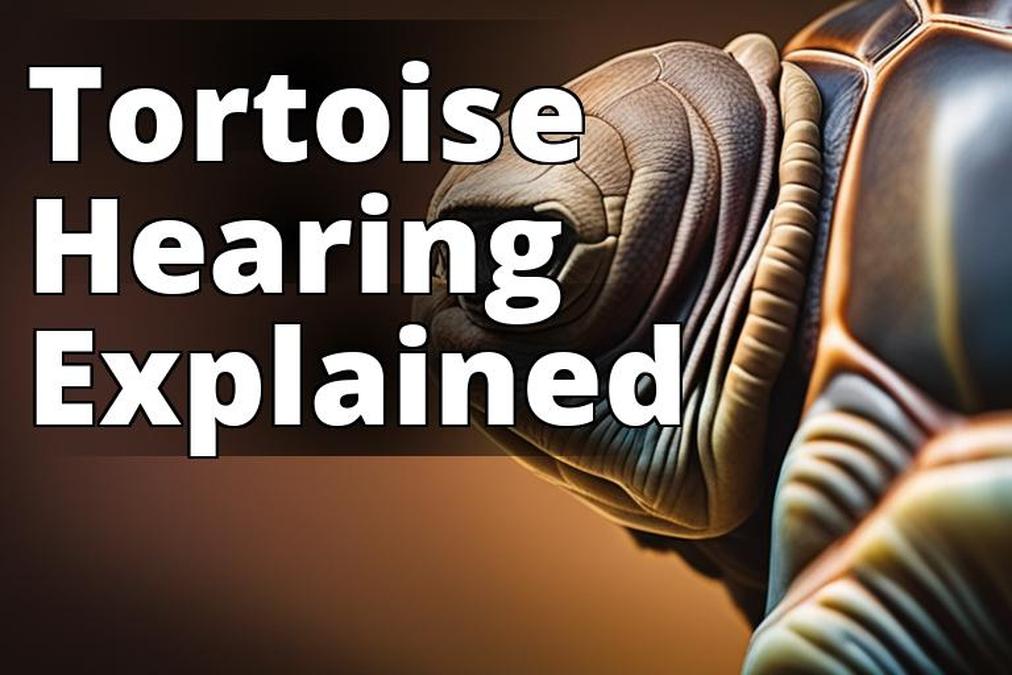Tortoises are fascinating creatures that have been around for millions of years. They come in various sizes and shapes, but they all have one thing in common – their reputation for being slow and steady. While they are known for their tough shells and longevity, one question that often arises is whether tortoises can hear or if they are deaf. In this article, we will explore the truth about tortoise hearing and discuss how it affects their lives.

Tortoise Anatomy
Before we dive into tortoise hearing, its important to have a basic understanding of their anatomy. Tortoises have a unique physical structure that is designed to protect them from predators and environmental factors.
A. External Features
Tortoises have a hard shell made of keratin, which covers their entire body, except for their legs, head, and tail. They also have two front legs and two back legs that are adapted for walking on land. Their feet have claws that help them dig and climb, making them excellent burrowers.

B. Ear Structure
Tortoises have an interesting ear structure that is different from humans. Their ears are located on the side of their head, covered by a scaly skin flap called the operculum. The ear canal is short and leads to the middle ear, which is a small cavity containing three tiny bones that conduct sound vibrations to the inner ear. The inner ear consists of a fluid-filled cavity that contains the sensory cells responsible for hearing.
C. Comparison with Human Ear Structure
While the basic structure of the human ear is similar to that of the tortoise, there are some significant differences. Humans have an external ear canal that is longer and more flexible than a tortoise’s, which helps us hear a wider range of frequencies. Additionally, humans have a more complex inner ear structure that allows us to perceive and interpret sound more accurately.

Tortoise Hearing Ability
- Tortoises are not completely deaf, but they have limited hearing ability.
- They can hear low frequency sounds and vibrations, but not high frequency sounds.
- Factors such as age, health conditions, and environmental factors can affect their hearing ability.
Tortoise Hearing
Now that weve covered the basics of tortoise anatomy, let’s dive into the fascinating topic of tortoise hearing.
A. Tortoise Hearing Ability
Tortoises are not deaf, but their hearing ability is limited compared to humans. They can detect low-frequency sounds, but they struggle to hear high-pitched sounds. Tortoises use their hearing to detect vibrations in the ground and air, which helps them identify potential predators and prey.
B. Frequency Range
The frequency range of tortoise hearing varies depending on the species and age. Some species can detect sounds as low as 20 Hz, while others can hear up to 5,000 Hz. However, their ability to hear high-frequency sounds deteriorates as they age.
C. Comparison with Human Hearing Ability
Humans have a much wider frequency range than tortoises, with the ability to hear sounds between 20 Hz and 20,000 Hz. We also have a more sophisticated inner ear structure that allows us to detect and interpret a wide range of sounds.
D. Tortoise Response to Sound
Tortoises respond to sound differently than humans. Rather than moving their ears, they use their entire body to detect and respond to sound. They may stop moving, retract into their shells, or even run away when they hear a loud or unfamiliar sound.

Factors Affecting Tortoise Hearing
| Question | Answer |
|---|---|
| Can tortoises hear at all? | Yes, tortoises can hear, but their hearing ability is limited compared to humans. |
| What is the frequency range of tortoise hearing? | The frequency range of tortoise hearing varies depending on the species and age. Some species can detect sounds as low as 20 Hz, while others can hear up to 5,000 Hz. |
| How do tortoises respond to sound? | Tortoises use their entire body to detect and respond to sound. They may stop moving, retract into their shells, or even run away when they hear a loud or unfamiliar sound. |
| What are the signs of deafness in tortoises? | Signs of deafness in tortoises can include a lack of response to sound and changes in behavior, such as becoming more withdrawn or aggressive. |
| How can I care for a deaf tortoise? | You can care for a deaf tortoise by providing a safe environment and using visual cues to help them navigate their surroundings. |
| How can I prevent hearing loss in my tortoise? | You can prevent hearing loss in your tortoise by providing a quiet environment, avoiding exposure to loud noises, and providing a healthy diet. |
Several factors can affect tortoise hearing, including age, health conditions, and environmental factors.
A. Age
As tortoises age, their hearing ability deteriorates. This is due to the natural degeneration of their sensory cells in the inner ear, which makes it harder for them to detect high-frequency sounds.
B. Health Conditions
Tortoises with ear infections or other health conditions may experience hearing loss. In some cases, hearing loss may be temporary and can be treated with medication or other treatments.
C. Environmental Factors
Environmental factors, such as loud noises, can also affect tortoise hearing. Exposure to loud noises for extended periods can cause permanent hearing damage or loss.
D. Comparison with Other Animals
Compared to other animals, tortoises have a limited hearing range. For example, dogs and cats can hear a wider range of frequencies and are more sensitive to sound.
Signs of Deafness in Tortoises
Signs of deafness in tortoises can be challenging to detect, but there are some common symptoms to look out for.
A. Lack of Response to Sound
Tortoises that are deaf or hard of hearing may not respond to sound as they used to. They may not react to loud noises or their name being called, which can be a sign of hearing loss.
B. Change in Behavior
Deaf or hard of hearing tortoises may exhibit changes in behavior, such as becoming more withdrawn or aggressive. They may also have difficulty finding food or water without visual cues.
C. Comparison with Other Animals
Signs of deafness in tortoises can be similar to other animals, such as dogs and cats. However, the symptoms may appear less obvious due to the tortoise’s natural behavior of being slow and steady.
Caring for a Deaf Tortoise
If you suspect that your tortoise is deaf, there are several things you can do to provide them with a safe and comfortable environment.
A. Providing a Safe Environment
Provide a safe environment for your tortoise by ensuring that their enclosure is secure and free from potential hazards. This is especially important for deaf tortoises who may not be able to detect potential dangers.
B. Using Visual Cues
Use visual cues to help your tortoise navigate their environment. Place food and water bowls in easily visible locations and use brightly colored objects to help them find their way around.
C. Comparison with Other Animals
Caring for a deaf tortoise is similar to caring for other deaf animals, such as dogs and cats. Providing a safe environment and using visual cues can help them live a comfortable and happy life.
Preventing Hearing Loss in Tortoises
Preventing hearing loss in tortoises is essential to maintain their quality of life.
A. Providing a Quiet Environment
Provide a quiet environment for your tortoise by avoiding loud noises or sudden sounds. This is especially important if your tortoise is young or has a history of ear infections.
B. Avoiding Exposure to Loud Noises
Avoid exposing your tortoise to loud noises, such as music or fireworks. If you must expose them to loud noises, consider using ear protection or keeping them in a quiet room.
C. Providing a Healthy Diet
Providing a healthy diet can help maintain your tortoise’s overall health, which can also impact their hearing ability. Consult with a veterinarian or animal nutritionist to determine the best diet for your tortoise.
D. Comparison with Other Animals
Preventing hearing loss in tortoises is similar to preventing hearing loss in other animals, such as dogs and cats. Providing a quiet environment, avoiding exposure to loud noises, and providing a healthy diet can help maintain their hearing ability.
Personal Story: A Tale of Two Tortoises
When I was growing up, my family had two pet tortoises – a sulcata named Timmy and a Russian tortoise named Sasha. Despite their similar size and appearance, they had very different reactions to sound.
Timmy, the sulcata, seemed to be able to hear us when we approached his enclosure and would often perk up and walk towards us. Sasha, on the other hand, seemed completely oblivious to any noise we made. We could clap, talk loudly, or even play music nearby and she wouldn’t react at all.
It wasn’t until we did more research on tortoise hearing that we realized Sasha’s lack of response was likely due to her species having a more limited hearing range. Timmy, as a sulcata, had a better ability to hear higher frequencies and was more responsive to sound as a result.
This personal experience highlights the differences in hearing ability among tortoise species, and how important it is to understand their individual needs and behaviors when caring for them as pets.
Conclusion
In conclusion, tortoises are not deaf, but their hearing ability is limited compared to humans. Factors such as age, health conditions, and environmental factors can affect their hearing ability. Signs of deafness in tortoises can be challenging to detect, but there are ways to care for a deaf tortoise and prevent hearing loss. Understanding tortoise hearing is essential for providing them with a safe and comfortable environment that meets their needs. By taking steps to protect their hearing, we can help ensure that tortoises live long and healthy lives.







